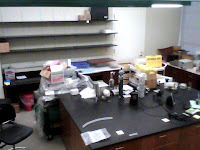Thursday, December 2, 2010
Church Hill tutoring sessions lift up neighborhood | Richmond Times-Dispatch
Thursday, September 16, 2010
Microlectures via Podcasting
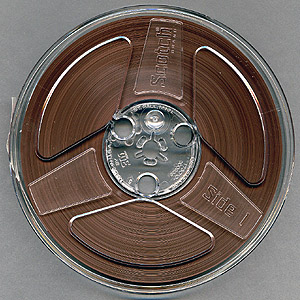
Podcasts do not need to contain the full information from a 60-to-90 minute lecture. San Juan College is experimenting with "microlectures," a traditional lecture in which key concepts and themes are condensed down to a one to three minute segment (Shieh, 2009, p. 1). Some faculty find that a three-to-five minute audio clip is an optimum podcast length, similar to the length of a song students listen to on the radio (Walsh, 2004). Because microlectures are limited in the amount of content they can convey, students are required to complete their learning with additional readings and assignments. Pedagogical limitations include situations where a prolonged discussion or explanation is necessary, such as when solving mathematical problems, extending English literature discussions, and explaining complicated processes.
Wednesday, August 25, 2010
Landon's Lab Lets Loose
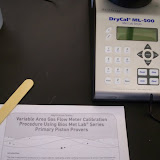
Monday, August 9, 2010
Valedictorian on Education
Thursday, July 15, 2010
Progress!

A new post, A new post. Yes, progress to the process. Documented above. I will make some more posts about the work that will happen in the next week:
-Presentation of progress to Dean Jamison on Wednesday
-Generation of the first aerosol, hopefully before then!
More to come!
Wednesday, April 21, 2010
Open Access and Publishing
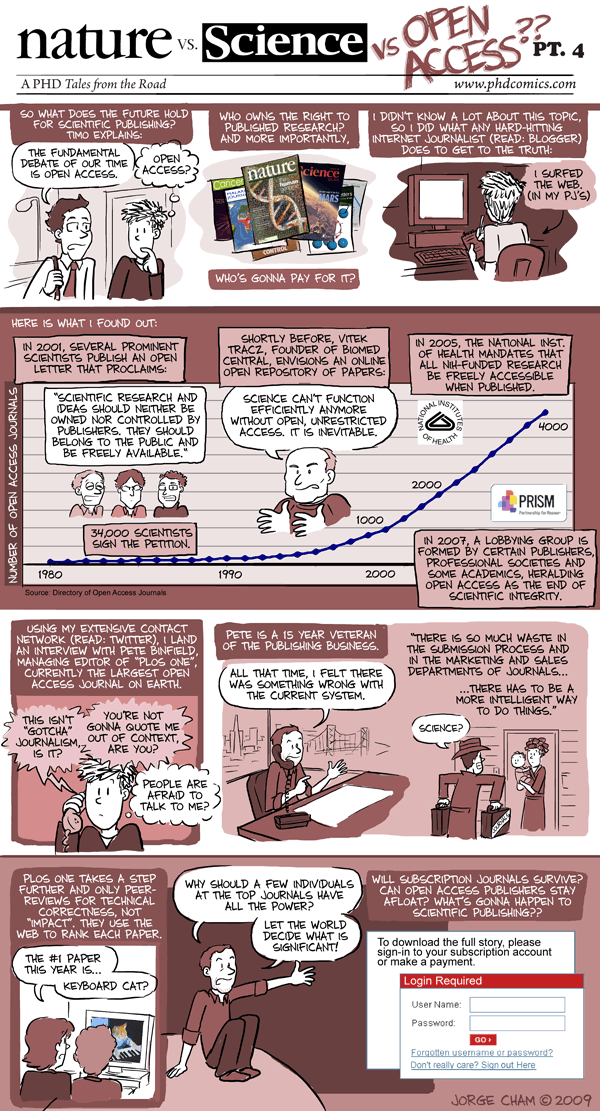
Friday, April 16, 2010
Whorls and Fleas
Big fleas have little fleasUpon their backs to bite 'em,
And little fleas have lesser fleas
And so, ad infinitum.
-- Jonathan Swift
Big whorls have little whorlsThat feed on their velocity,
And little whorls have lesser whorls
And so on to viscosity.
-- Lewis F. Richardson
Thursday, April 15, 2010
She may not look like much, but she's got it where it counts, kid.
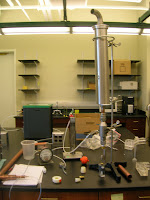 Dr Oldham visited to round out the first week of empiricism. He walked in lab proud of the equipment and confident in the ability of the devices to produce useful data.
Dr Oldham visited to round out the first week of empiricism. He walked in lab proud of the equipment and confident in the ability of the devices to produce useful data.Wednesday, April 14, 2010
Day three, a visit from Ben Kenobi

With Ben Spence's help we have setup the lab and I am beginning to understand what some of the machines do in it. But this is all very important for us to have it like this because today we'll have a visitor. A wise sage, Dr. Mike Oldham, is coming to give us guidance in becoming experimentalists.


Tuesday, April 13, 2010
Day 2 Engineering Experiment
 |
| From Ordinary Radical Engineering |
 |
| From Ordinary Radical Engineering |
With that, I'm off!
Monday, April 12, 2010
What does a PhD in Mechanical Engineering look like at VCU

Monday, March 29, 2010
Net Gen- The Catering Gen

Thursday, March 4, 2010
Lesson Planning and Course Design Considerations (Birth of an Idea)
Design and Teach Your (a) Course
In general, a helpful way to design a course is to proceed through the following phases:
1) Identify desired results— GOALS
Application to teach an honors course/module
Thank you for your interest in teaching a course or module with the Honors College.
- You will need the following information to complete the application:
- A description of the course or module.
- The course or module syllabus and bibliography.
- Your time and day preferences.
- Your curriculum vitae (CV).
Friday, February 19, 2010
And The Dream goes On
Most of the "brethren" think that education should equip them with the proper instruments of exploitation so that they can forever trample over the masses. Still others think that education should furnish them with noble ends rather than means to an end.
If we are not careful, our colleges will produce a group of close-minded, unscientific, illogical propagandists, consumed with immoral acts. Be careful, "brethren!" Be careful, teachers!
Thursday, February 18, 2010
Formative Years...
...assessment encompasses teacher observation, classroom discussion, and analysis of student work, including homework and tests. Assessments become formative when the information is used to adapt teaching and learning to meet student needs.
students who understand the learning objectives and assessment criteria and have opportunities to reflect on their work show greater improvement than those who do not
* Invite students to discuss their thinking about a question or topic in pairs or small groups, then ask a representative to share the thinking with the larger group (sometimes called think-pair-share).
* Present several possible answers to a question, then ask students to vote on them.
* Ask all students to write down an answer, then read a selected few out loud.
Teachers might also assess students' understanding in the following ways:
* Have students write their understanding of vocabulary or concepts before and after instruction.
* Ask students to summarize the main ideas they've taken away from a lecture, discussion, or assigned reading.
* Have students complete a few problems or questions at the end of instruction and check answers.
* Interview students individually or in groups about their thinking as they solve problems.
* Assign brief, in-class writing assignments (e.g., "Why is this person or event representative of this time period in history?)
In addition to these classroom techniques, tests and homework can be used formatively if teachers analyze where students are in their learning and provide specific, focused feedback regarding performance and ways to improve it. Black and Wiliam (1998b) make the following recommendations:
* Frequent short tests are better than infrequent long ones.
* New learning should be tested within about a week of first exposure.
The Minute Paper tests how students are gaining knowledge, or not. The instructor ends class by asking students to write a brief response to the following questions: "What was the most important thing you learned during this class?" and "What important question remains unanswered?"
The Muddiest Point is one of the simplest CATs to help assess where students are having difficulties. The technique consists of asking students to jot down a quick response to one question: "What was the muddiest point in [the lecture, discussion, homework assignment, film, etc.]?" The term “muddiest” means “most unclear” or “most confusing.”
The What’s the Principle? CAT is useful in courses requiring problem-solving. After students figure out what type of problem they are dealing with, they often must decide what principle(s) to apply in order to solve the problem. This CAT provides students with a few problems and asks them to state the principle that best applies to each problem.
Defining Features Matrix: Prepare a handout with a matrix of three columns and several rows. At the top of the first two columns, list two distinct concepts that have potentially confusing similarities (e.g. hurricanes vs. tornados, Picasso vs. Matisse). In the third column, list the important characteristics of both concepts in no particular order. Give your students the handout and have them use the matrix to identify which characteristics belong to each of the two concepts. Collect their responses, and you’ll quickly find out which characteristics are giving your students the most trouble.
WHAT ARE WEEKLY REPORTS?
Weekly Reports are papers written by students each week, in which they address 3 questions:
- What did I learn this week?
- What questions remain unclear?, and
- What questions would you ask your students if you were the professor to find out if they understood the material?
(2) What can you do in the classroom that you can't do anywhere else?
Friday, February 12, 2010
Bicycle Apprenticeship

“We’ve all heard the saying , “Give someone a fish and they’ll eat for a day, but teach them to fish and they’ll eat for the rest of their life.” But our friend John Perkins challenges us to go farther. He say, “The problem is that nobody is asking who owns the pond or who polluted it.”
Shane Claiborne - The Irresistable Revolution
The aftermath of nonviolence is the creation of the beloved community, so that when the battle is over, a new relationship comes into being between the oppressed and the oppressor.-Dr. Martin Luther King Jr
Tuesday, February 9, 2010
Undergraduate Educators
If beginning teachers are to be successful, they must wrestle simultaneously with issues of pedagogical content (or knowledge) as well as general pedagogy (or generic teaching principles)
There is a list of features of what we want to teach. I'm not sure how this is related to comprehension. In those features are contained,
- To teach students to believe and respect others, to contribute to the well-being of their community
- To give students the opportunity to learn how to inquire and discover new information
All teachers must learn to observe outcomes and determine the reasons for success or failureAnd this is where we claim no gap between "squishy-hard" sciences. This is teaching, and it is based in reality. If we see something has failed, we try to figure out why it did and we only reenact it in our head. We don't repeat a failed method without good reason.
Moving to our second reading we now consider the shift of paradigms. We wish to observe a shift in our educational system from providing instruction to producing learning. Concerning the differences in how we may rate and quantify our progress we see:
We are so wedded to a definition of quality based on resources that we find it extremely difficult to deal with the results of our work, namely student learning.I do have a worry about the learning production paradigm that is contained within the next statement:
It supports any learning method and structure that works, where "works" is defined in terms of learning outcomes, not as the degree of conformity to an ideal classroom archetype.In fact, the Learning Paradigm requires a constant search for new structures and methods that work better for student learning and success, and expects even these to be redesigned continually and to evolve over time.
"Fractionated instruction maximizes forgetting, inattention, and passivity. Both children and adults acquire knowledge from active participation in holistic, complex, meaningful environments organized around long-term goals. Today's school programs could hardly have been better designed to prevent a child's natural learning system from operating."
We need to work to have state legislatures change the funding formulas of public colleges and universities to give institutions the latitude and incentives to develop new structures for learning.
Monday, February 8, 2010
Engineering Social Reform
Your people will rebuild the ancient ruins and will raise up the age-old foundations; you will be called Repairer of Broken Walls, Restorer of Streets with Dwellings. - The Bible, NIV, Isaiah 58:12
There is visible a great downfall to this whole progression of business. That downfall is that the upward march of progress in the global market appears to be to the edge of an unsure cliff. We want to compare what it is that we are hoping to accomplish versus what we are actually accomplishing. Therefore we need to stop teaching our students facts and formulas while withholding the dynamic interactions and conflicts within their very education. Can you train a student to solve a local problem within the frame of the bigger global picture by instructing her in how to solve a problem without a bigger picture? This compartmentalization of education has lead to a disenfranchised generation by causing a lack of coherence and purpose in our curriculum.
An Engineering Curriculum
Friday, February 5, 2010
Chlorophytum comosum
 The ideal student/teacher relationship: Chlorophytum comosum, or better known as the spider plant. Out of the plant grows a new plant. It branches off and lands on the ground. Still connected to the mother plant, it gains nutrients from the host while developing roots of its own. It is possible for these roots to grow in water without the host plant, but the result will not be as full. Can this be considered an analogy for an ideal student teacher relationship? The teacher can provide a secure structure to work within and students branch out to develop roots of their own. Influenced by the host yet unique to themselves, these students have the capability to flourish on their own and in time play the role of host or teacher to the next generation of students.
The ideal student/teacher relationship: Chlorophytum comosum, or better known as the spider plant. Out of the plant grows a new plant. It branches off and lands on the ground. Still connected to the mother plant, it gains nutrients from the host while developing roots of its own. It is possible for these roots to grow in water without the host plant, but the result will not be as full. Can this be considered an analogy for an ideal student teacher relationship? The teacher can provide a secure structure to work within and students branch out to develop roots of their own. Influenced by the host yet unique to themselves, these students have the capability to flourish on their own and in time play the role of host or teacher to the next generation of students. This may also help to explain the disparity of how a student becomes a teacher. Thus we respectfully submit our solution to the transient problem of the ideal student/teacher relationship.
Signed,
The Radical and Empirical
fierdeltreempirical.wordpress.com
Thursday, February 4, 2010
Teaching Perspectives
04-FEB-10
----------------------
Transmission total: (Tr) 33.00
B=13; I=9; A=11
Apprenticeship total: (Ap) 35.00
B=12; I=12; A=11
Developmental total: (Dv) 37.00
B=11; I=12; A=14
Nurturance total: (Nu) 31.00
B=10; I=10; A=11
Social Reform total: (SR) 37.00
B=11; I=12; A=14
----------------------
Beliefs total: (B) 57.00
Intention total: (I) 55.00
Action total: (A) 61.00
----------------------
Mean: (M) 34.60
Standard Deviation: (SD) 2.33
HiT: (HiT) 37.00
LoT: (LoT) 32.00
----------------------
Overall Total: (T) 173.00
For what it's worth, people have told me that I am not a normal engineer.
- An Ordinary Radical Engineer
Wednesday, February 3, 2010
Chai Chai Chai
After having a nice cup of Chai this morning and wondering what a home made chai might taste like, I began looking forward to iced chai and the summertime. Then my yogurt company sent me a recipe for a Chai Smoothie. Score!
Tuesday, February 2, 2010
Modulation in Moderation
Monday, February 1, 2010
Teaching a passion (with passion)
Single-loop learning is like a thermostat that learns when it is too hot of too cold and turns the heat on or off. The thermostat can perform this task because it can receive information (the temperature of the room) and take corrective action. Double-looplearning occurs when error is detected and corrected in ways that involve the modification of an organization’s underlying norms, policies and objectives.
Single-loop learning seems to be present when goals, values, frameworks and, to a significant extent, strategies are taken for granted. The emphasis is on ‘techniques and making techniques more efficient’ (Usher and Bryant: 1989: 87) Any reflection is directed toward making the strategy more effective. Double-loop learning, in contrast, ‘involves questioning the role of the framing and learning systems which underlie actual goals and strategies’
When looking at a situation we are influenced by, and use, what has gone before, what might come, our repertoire, and our frame of reference. We are able to draw upon certain routines. As we work we can bring fragments of memories into play and begin to build theories and responses that fit the new situation
Like Dr. Walter H. G. Lewin
- Have they already seen the material you are presenting?
- How can you present it in such a way that leads them to discover it instead of insisting on knowledge? (double loop)
- Take time to reflect on when did you first learned what you're about to teach. This may help plan escape routes and backup options for unfortunate classroom experiences.
- What cognitive stage of development are your students at? Try to gauge how deep you can go into the subject.
- Be ready to adapt to the level of depth (aim for significance and come up when necessary)
- Find your passion for the material and try to convey your passion both for the material presented and for the student's success in understanding material and acquiring a similar passion
- Have a structured balance of community, lecture, and reflection. Encourage idea generation and creativity to try to solve problems.
- Discover what the passion of the student is.
Lecture 27: Fluid Mechanics - Pascal's Principle - Hydrostatics - Atmospheric Pressure - Over Pressure in Lungs and Tires
